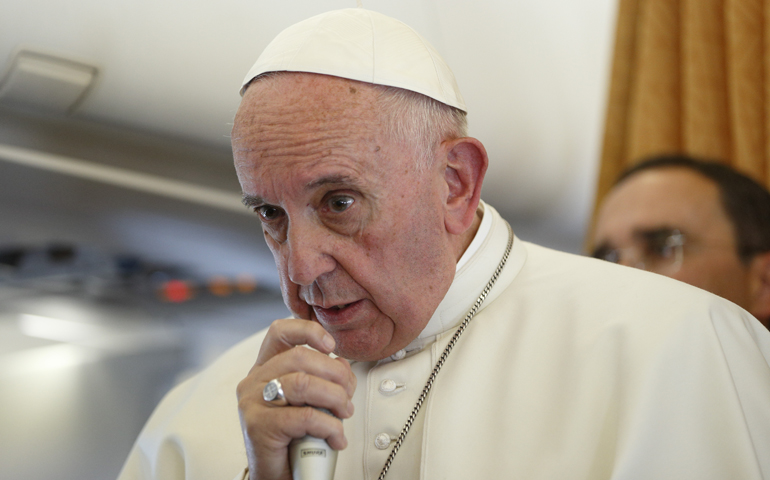
Pope Francis answers questions from journalists aboard his flight from Malmo, Sweden, to Rome Nov. 1. (CNS/Paul Haring)
While countries should be open to taking in refugees and migrants in need they also must be prudent about only accepting as many as they can integrate into their societies, Pope Francis said.
In a press conference aboard the papal flight back to Rome after a two-day visit to Sweden, the pontiff was asked about countries that have accepted large numbers of migrants but are now considering stricter border controls.
"I believe that ... you cannot close your heart to a refugee," said Francis, but added that governments must use prudence to "make a calculation for how [refugees] can be settled because you must not only receive refugees but proceed to integrate them."
"If a country has a capacity of 20 for integration, let's say, do it up to that," the pope suggested. "If more, do more."
"But always, an open heart," Francis continued. "It is not human to close your hearts. And in the long run, you pay [for it]."
Francis spoke about refugees in a 40-minute conference in which he also talked about the process of secularization in Europe, his recent visit at the Vatican with Venezuelan President Nicolás Maduro, and the Catholic church's ban on the priestly ordination of women.
Related: "Pope Francis confirms finality of ban on ordaining women priests" (Nov. 1, 2016)
The pope was asked about migrants in the context of Sweden's historically high acceptance rate for asylum seekers. In 2015, the country accepted some 160,000 but is now considering stricter controls.
Francis said he was particularly grateful to Sweden as a native South American for its welcoming of refugees escaping the region's military dictatorships in the 1970s and 80s.
"Sweden has a long tradition of welcoming; not only receiving, but integrating, searching right away for homes, schools, work; integrating a people," he said.
The pope spoke about the Venezuelan president after being asked why he chose to meet Oct. 24 with Maduro, who is facing criticism due to an ongoing economic crisis in his country.
Francis said he had not visited with Maduro since 2013 and that the president had scheduled an appointment some months ago that had to be canceled due to an illness.
"I listened to him for a half-hour during the appointment," said the pontiff of the president. "I asked some questions and I heard his point of view. It is always good to get a sense of the entire atmosphere. I heard his point of view."
Maduro's critics in Venezuela accuse him of acting in an authoritarian manner by blocking a recall referendum on his rule. He and opposition leaders convened talks on Sunday aided by Archbishop Claudio Maria Celli, an Italian and the former head of the Pontifical Council for Social Communications who Francis sent as a papal envoy.
"Dialogue is the only path for all conflicts" to be resolved, Francis said Tuesday. "You dialogue or you scream. There is no other way."
"I believe that you must go on this path," said the pope. "I do not know how it will end up."
Francis was asked about secularization in the context of French society, where 63 percent of the population is estimated as identifying as non-religious.
"When there is secularization, we can always say that there is some weakness in evangelization," said the pope, adding that a cultural process in which people begin to think they are lords over everything also causes secularization.
[Joshua J. McElwee is NCR Vatican correspondent. His email address is jmcelwee@ncronline.org. Follow him on Twitter: @joshjmac.]




